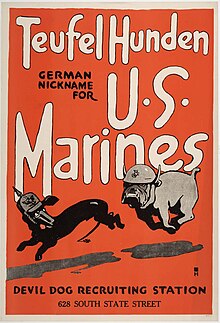Devil Dog

Teufel Hunden, allegedly meaning Devil Dogs in German, is a motivational nickname for a U.S. Marine.
U.S. Marine Corps legends
According to tradition in the United States Marine Corps, the moniker was used by German soldiers to describe U.S. Marines who fought in the Belleau Wood in 1918. The Marines fought with such ferocity that they were likened to "Dogs from Hell." Although unverified by the Germans, the reports were made by American media at the time. While the legend persists, the Devil Dogs nickname for Marines first appeared in newspapers in the United States in April 1918, about two months before the Battle of Belleau Wood. The La Crosse (Wisconsin) Tribune ran a story about the nickname on April 27, 1918, and other newspapers used the story as early as April 15, 1918. The Battle of Belleau Wood began on June 1, 1918. [1][2]
Gas masks

Some Marines offer a more detailed story: The Battle of Belleau Wood was fought in France in the summer of 1918, in the midst of a heat wave. At some point during the battle, the Marines were ordered to take a hill occupied by German forces. As the Marines made ready to charge the hill, word came down from command that the Germans were preparing to use mustard gas to repel the attack. As a precaution, the Marines were ordered to put on their gas masks and take the hill. While the Marines fought their way up the hill, the heat caused them to sweat profusely, foam at the mouth and turned their eyes bloodshot. Additionally, at some points the hill was very steep, which caused the Marines to have to scramble on all fours to make their way up. Consequently, from the Germans' vantage point, they witnessed a pack of tenacious, growling figures whose lower faces were obscured by gas masks (which at the time had a prolonged shape that somewhat resembled a snout) but left open their bloodshot eyes and mouth foam seeping from the sides, advancing up the hill, sometimes on all fours, and killing everything in their way. As the legend goes, the German soldiers, upon seeing this spectacle, began to yell that they were being attacked by "dogs from hell."
Dispatch
USMC Master Gunnery Sergeant Phil Mehringer (2008) explains it like this:
"The term "Devil Dog" has its origins at Belleau Wood. It was in a dispatch from the German front lines to their higher headquarters explaining the current battle conditions that described the fighting abilities of the new, fresh Americans as fighting like "Teufel Hunden" or "Hounds from Hell.""[3]
Grammar problems
A poster created by Charles B. Falls in 1918 (exhibited further up) was one of the first recorded references to the term.
In German, a compound noun is always a single word, so using two words "Teufel Hunden" is grammatically incorrect. The correct German would be Teufelshunde in nominative, genitive, and accusative cases, and Teufelshunden only in the dative. In either form, the linking element "s" steps between the words. Examples:
- Sie waren Teufelshunde. - they were devil dogs.
- Er war ein Teufelshund. - he was a devil dog.
- Er sprach von den Teufelshunden. - he talked about the devil dogs.
Furthermore, the word "Teufelshund" is unknown in the German language. The nearest equivalent is "Höllenhund" ("dog of hell"), the german translation of the mythical Kerberos; a term that can also be used to describe a reckless and courageous person. All this suggests that the Marines were never actually referred to as "devil dogs" by German WW1 soldiers.[1]
Modern use
The term "Devil Dog" is a very common nickname for all Marines. "Devil Dog" is historically a well accepted term of endearment. Professional Military Education had stated "Devil Dog" is a title of honor, and should be regarded as such. "Devil Dog" should be called out when praising ones actions when they are in keeping with the high standards of the Corps. The "dog" in the phrase is usually depicted as a bulldog in line with the original 1918 poster. The bull dog is the official mascot of the Corps. A line of bulldogs had served as the unofficial mascot of the Corps since the 1920s, most named after Lieutenant General Lewis Burwell "Chesty Puller".
In contrast the term has also taken on a negative conotation due to its usage when correcting Marines. The term "Devil Dogged" has come to mean lectured, usually for being out of acceptable Marine Corps regulations. .[4]
Senior Marines will often call out other Marines who are out of regulation. For example 1st Sgt. Jones notices that an unknown Lance Corporal has a dirty uniform at the PX. 1st Sgt Jones may yell across the room "Hey there, Devil Dog!" Once the LCpl realizes he is being addressed, he would reply "Yes, First Sergeant" The 1st Sgt would order, "Go to your barracks, and square way that filthy blouse!" After returning to the barraks the LCpl's roommate may ask him how his trip to the PX was, the LCpl would respond "Aside from getting 'Devil Dogged', it was okay."
See also
References
- ^ a b Flippo, Hyde. "German Myth 13: Teufelshunde - Devil Dogs". About.com.
{{cite web}}: Cite has empty unknown parameter:|coauthors=(help) - ^ Simmons, Edwin H.: "Leathernecks at Soissons." Naval History, DEC 2005.
- ^ "Marine Corps Page".
- ^ Tilghman, Andrew (April 28, 2008). "Don't Dog Me". MARINE CORPS TIMES.
{{cite web}}: Cite has empty unknown parameter:|coauthors=(help)

